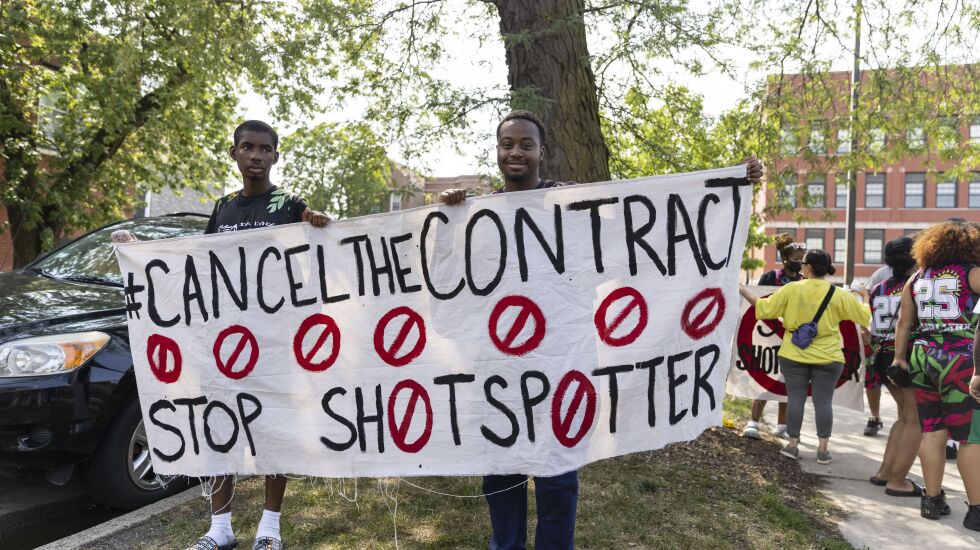
Through numerous teach-ins, canvassing shifts and public pressure, Chicago organizers have successfully tarnished ShotSpotter’s name. But it hasn’t gone away.
Following a week of bad press, the surveillance technology company announced a new corporate name. First, the California-based firm’s stock prices plummeted following the election of Brandon Johnson, whose platform includes nixing the city’s contract with the company. Then, now-outgoing Chicago Police Supt. Eric Carter recommended the firing of the officer who, when responding to a ShotSpotter alert, shot and killed 13-year-old Adam Toledo in 2021.
ShotSpotter has rebranded itself as SoundThinking, a self-described “public safety technology company that combines transformative solutions and strategic advisory services to improve community safety.” We — members of Chicago’s Black and Brown communities who have campaigned against ShotSpotter for years — are not deceived.
ShotSpotter has always been, and remains, a false solution to the real problem of gun violence.
We urge our newly elected officials and Chicago communities not to fall for this PR stunt: SoundThinking is still ShotSpotter, the company still selling surveillance technology that research suggests increases harmful interactions with police.
ShotSpotter technology primarily comprises microphones that sit in plain view in our neighborhoods, sending alerts to call centers in Newark, California or Washington, D.C. where a ShotSpotter employee ultimately decides whether or not a loud sound that was picked up was a gunshot. If so, the technology sends an alert to the Chicago Police Department, which then deploys officers to the location of the sound.
But this technology does nothing to prevent gun violence. According to a report by Northwestern University School of Law’s MacArthur Justice Center, in 90% of cases, it does not even lead to evidence of gun use. Further, a report by the city’s Office of Inspector General shows that the technology increases stop-and frisk-procedures.
In its rebrand, ShotSpotter continues with the false narrative that reliance on surveillance and police is the only thing that will keep us safe, claiming that it provides “transformative solutions” and “improves community confidence in police.” The company has also co-opted the language of activists who are demanding alternatives to surveillance and policing: it launched the SafetySmart Suite, a platform that it says “provides law enforcement and community groups the tools they need for safer and healthier neighborhoods.”
Mimicking the language of organizers and activists, the company describes its tools as “equitable.” But surveillance does not make our communities healthier. And there is no “equity” or justice in surveillance.
The history of ShotSpotter’s contract with the city also raises alarm. The initial contract was implemented without the typical request-for-proposals process, and has been quietly extended twice since 2020 without input from communities or City Council. The cost is around $8.9 million a year, and the most recent contract extension will cost another $5.7 million, bringing the total cost of ShotSpotter’s contracts since 2018 to $38.7 million. That is $38.7 million of resources our communities could have used over those five years.
And the money from ShotSpotter’s contract does not come from CPD’s nearly $2 billion budget. Instead, the money that funds gunshot detection comes from a state surcharge on our cellphone bills. The Illinois Emergency Telephone System Act states that any municipality with over 500,000 people can use this surcharge to pay for “antiterrorism” tools, such as surveillance cameras and gunshot detection technology. So the city and the CPD don’t require public input to spend this money. Luckily, this section of the Act is set to be repealed in December.
The contract for ShotSpotter is managed by the Office of Public Safety Administration, but City Council has the power to renew or deny a budget that includes funds for the next gunshot detection contract — whether through SoundThinking or another company. We urge the mayor-elect and City Council members to deny the budget as-is, cancel the ShotSpotter contract, and divert those funds to community-led violence prevention and interruption efforts.
The country is watching to see how the election of a progressive mayor will play out in practice. Canceling the line item for gunshot detection technology and ending the city’s relationship with SoundThinking (aka ShotSpotter) will send a strong message. We must show the country that Chicago believes that public safety doesn’t include surveillance tools that allow corporations to profit from our pain. Our actions now will show corporations that they cannot rebrand their harm and expect to avoid accountability.
Sharah Hutson is an organizer with the Stop Shotspotter Campaign, and Alyx Goodwin is deputy campaigns director at the Action Center on Race & the Economy (ACRE).
The Sun-Times welcomes letters to the editor and op-eds. See our guidelines.
The views and opinions expressed by contributors are their own and do not necessarily reflect those of the Chicago Sun-Times or any of its affiliates.







